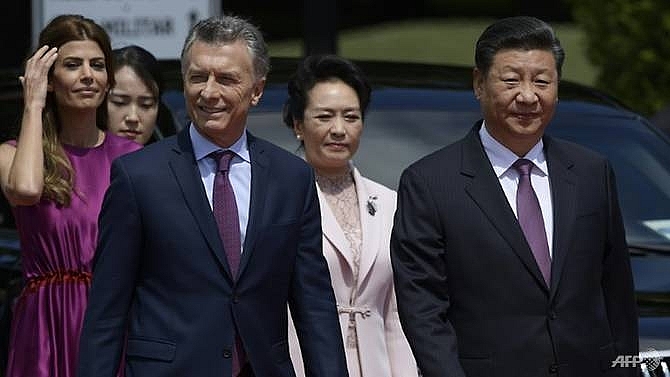China agrees US$9b currency swap with Argentina
 |
| Chinese President Xi Jinping (right) was received by his Argentine counterpart Mauricio Macri (left) for a state visit after the G20 summit. (AFP/JUAN MABROMATA) |
Struggling to recover after a currency crisis earlier this year, Latin America's third largest economy sought the help of the International Monetary Fund - which approved a US$56 billion loan package.
Now, this latest agreement will "contribute to greater financial stability and also facilitate trade" between China and Argentina, according to the bank's statement.
A currency swap sees two parties agree to exchange a certain amount of foreign currency at a pre-determined rate, protecting against fluctuations.
Argentina's central bank will be able to draw on these funds in an emergency.
The agreement followed the G20 summit in Buenos Aires, as Chinese President Xi Jinping was received by his Argentine counterpart Mauricio Macri for a state visit.
The two countries signed 30 trade and financial agreements in total.
"We are extending cooperation on economic, agricultural, financial and infrastructure issues," Xi told a press conference.
After Brazil, China is Argentina's second largest trade partner.
In 2017, the relationship was firmly in Beijing's favour: China exported US$17 billion of goods to Argentina, while importing US$8 billion of goods from that country.
Beijing and Buenos Aires also agreed another currency swap in 2014, which provided US$11 billion for Argentina's depleted treasury reserves.
What the stars mean:
★ Poor ★ ★ Promising ★★★ Good ★★★★ Very good ★★★★★ Exceptional
 Tag:
Tag:
Related Contents
Latest News
More News
- Russian President congratulates Vietnamese Party leader during phone talks (January 25, 2026 | 09:58)
- Worldwide congratulations underscore confidence in Vietnam’s 14th Party Congress (January 23, 2026 | 09:02)
- Political parties, organisations, int’l friends send congratulations to 14th National Party Congress (January 22, 2026 | 09:33)
- 14th National Party Congress: Japanese media highlight Vietnam’s growth targets (January 21, 2026 | 09:46)
- 14th National Party Congress: Driving force for Vietnam to continue renewal, innovation, breakthroughs (January 21, 2026 | 09:42)
- Vietnam remains spiritual support for progressive forces: Colombian party leader (January 21, 2026 | 08:00)
- Int'l media provides large coverage of 14th National Party Congress's first working day (January 20, 2026 | 09:09)
- Vietnamese firms win top honours at ASEAN Digital Awards (January 16, 2026 | 16:45)
- ASEAN Digital Ministers' Meeting opens in Hanoi (January 15, 2026 | 15:33)
- ASEAN economies move up the global chip value chain (December 09, 2025 | 13:32)






















 Mobile Version
Mobile Version